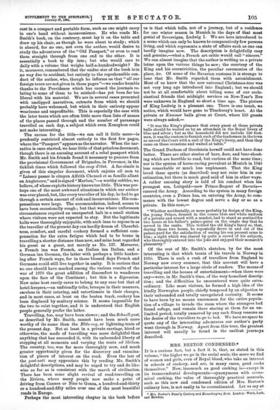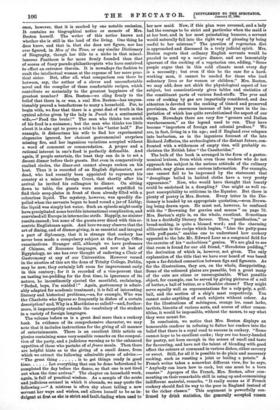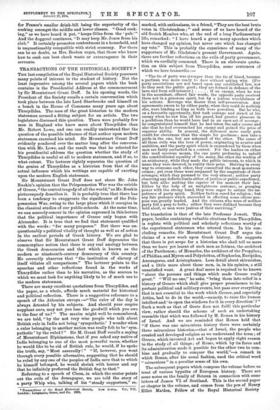MRS. BEETON CONDENSED.*
IT is a curious fact, but a fact it is, that, as stated in this volume, " the higher we go in the social scale, the more we find of women and girls, even of Royal blood, who take an interest in schools of cookery, and are, in many cases, good cooks themselves." Now, inasmuch as good cooking is—except in its transcendental developments—synonymous with econo- mical cooking, the value of thoroughly practical manuals, such as this new and condensed edition of Mrs. Beeton's culinary lore, is not easily to be overestimated. Let us say at • Mrs. Beaton's Family Cookery and Housekeeping 13cok. London: Ward, look, and Bowden. again, if people entertain, the least they can do is to set a The bulk of the book is arranged in the form of a gastro- decent dinner before their guests. But even in comparatively nomical lexicon, from which even those readers who do not exalted circles, the diner-out cannot always reckon on his approach the subject in the serious attitude of the culinary host. Thus it is recorded of an English diplomatist, now student, may glean some curious information. For example, dead, who had recently been appointed to represent his one cannot fail to be impressed by the statement that country at a minor foreign Court, that shortly after his " dumplings boiled in knitted cloths have a very pretty arrival he invited his colleagues to dinner. On sitting appearance." Now, who would have thought that beauty down to table, the guests were somewhat mystified to could be enshrined in a dumpling ? One might as well ex- find their soup-plates in front of them already filled with a pect susceptibility to criticism in the Equator. But there is colourless liquid. The mystery, however, was speedily dis- plenty of poetry in Mrs. Beeton. Every letter in the Dis- pelled when the servants began to hand round a jar of Liebig; tionary is headed by an appropriate quotation,—even Brown- the liquid was simply hot water. Such an episode might easily ing being drawn upon. He must not, however, be confused have precipitated some terrible international complication, and with the " Browning for gravies and sauces " on page 76. convulsed all Europe in internecine strife. Happily, no sinister Mrs. Beeton's style is, on the whole, excellent. Sometimes results ensued; but none of the guests ever dined with this ec- it has a decidedly literary flavour. Thus, " panification," or centric Englishman again. And here we may observe that the bread-making, is quite a blessed word; and the charming art of dining, and of dinner-giving, is so essential and integral alliteration in the recipe which begins, "Line the patty-pans a part of diplomacy, that it is strange that cookery has with puff-paste," enables one to understand how cookery never been made a compulsory subject at the Foreign Office appealed to the late Mr. Edward Lear as a congenial field for examinations. Stranger still, although we have professors the exercise of his " meloobious " genius. We are glad to see
of Chinese, of Romance languages, and now at last of that room is found for our old friend, " Herodotus pudding," Egyptology, no one has ever thought of endowing a Chair of the derivation of which is, however, not given. The only Gastronomy at any of our Universities. However versed explanation of the title that we have ever heard of was based in the niceties of this art the dons of Trinity College, Dublin, upon a far-fetched connection between figs and figments. As may be now, they certainly left room for improvement early for the illustrations, they are, on the whole, disappointing.
in this century; for it is recorded of a vice-provost that Some of the coloured plates are passable, but a great many on tasting ice-pudding for the first time, in ignorance of its of the cuts are otiose or unrecognisable. What possible nature, he incontinently ejected the mouthful, exclaiming, object, for example, can be served by giving pictures of a roll "Beda,d, boys, I'm scalded !" Again, gastronomy is admir- of butter, a ball of butter, or a Cheshire cheese ? They might ably adapted for academic treatment; it is full of interesting serve equally well as representations for a roly-poly, a golf- literary and historical problems,—as, for example, Who was ball, and the section of a ship's mast respectively. You the Charlotte who figures so frequently in dishes of a certain cannot make anything of such subjects without colour. As description? and, Why is a Macedoine so called P—and, further- for the illustrations of meringues, orange ice, roast larks, more, it imperceptibly extends the vocabulary of the student tartlets, biscuits of various sorts, and scores of other comes- in a variety of foreign languages. tibles, it would be impossible, without the names, to say what The volume before us is a great deal more than a cookery they were meant for. book. In evidence of its comprehensive character, we may In conclusion, we notice that Mrs. Beeton displays an note that it includes instructions for the giving of all manner honourable candour in refusing to flatter her readers into the of entertainments. There is an excellent little article on belief that there is a royal road to success in cookery. "Some picnics containing some very sensible remarks on the composi- cannot hope to be excellent cooks ; they are too heavy-handed tion of the party, and a judicious warning as to the enhanced for pastry, not keen enough in the senses of smell and taste appetites of those who partake of al fresco meals. Then there for flavouring, and have not the talent of blending with good are helpful hints as to the giving of a small dance, from effect the colours at command in various dishes, either savoury which we extract the following admirable piece of advice:— or sweet. Still, for all it is possible to do plain and necessary " The great thing is to get things ready in good cooking, such as roasting a joint or boiling a potato." A time Let everything that can be done beforehand be French writer takes a somewhat different view, for he says, completed the day before the dance, so that one is not tired " Anybody can learn how to cook, but one must be a born put when the time arrives." The chapter on household work, roaster." Apropos of the French, Mrs. Beeton, after com- again, is full of practical wisdom. As a sample of the acute menting on their remarkable skill in using up and economising and judicious counsel in which it abounds, we may quote the indifferent material, remarks, " It really seems as if French following :—" A mistress is often shy about telling a new cookery should find its way to the poor in England instead of servant her ways and wishes, and allows herself to be as in- to the richer classes." This argument is powerfully con-
dulgent at first as she is strict and fault,-finding when used to firmed by drink statistics, the generally accepted reason once, however, that it is marked by one notable omission. her new maid. Now, if this plan were reversed, and a lady It contains no biographical notice or memoir of Mrs. had the courage to be strict and particular when the maid is Beeton herself. The writer of this notice knows not at her best, and in her most painstaking humour, a servant whether she is still in the land of the living. One thing he would naturally fall into the right way of pleasing by being does know, and that is, that she does not figure, nor has useful to her mistress." The question of vegetarian diet ever figured, in Men of the Time, or any similar Dictionary is approached and discussed in a truly judicial spirit. Mrs. of Biography, though her title to a niche in that miscel- Beeton regrets that ordinary English servants would be laneous Pantheon is far more firmly founded than that puzzled to send up a nu igre dinner, and are lamentably of scores of fussy pseudo-philanthropists who have contrived ignorant of the cooking of a vegetarian one, adding, " Some to effect an entrance therein. It is nowadays the fashion to people argue that in this cold climate meat every day exalt the intellectual woman at the expense of her more prat- is a necessity ; but even if this be the case for a hard_ tical sister. But, after all, what comparison can there be working man, it cannot be needed for those who lead between, say, the author of a clever and uncomfortable sedentary lives or for women or children." Mrs. Beeton, novel and the compiler of these comfortable recipes, which we may add, does not shirk the physiological aspect of her contribute so materially to the greatest happiness of the subject, but conscientiously gives tables and statistics of greatest number P Mrs. Beeton—we cling firmly to the the constituent parts of various food-stuffs. The pros and belief that there is, or was, a real Mrs. Beeton—has unques- cons of cooking by gas are impartially considered, and due tionably proved a benefactress to many a household. For, to attention is devoted to the cooking of tinned and preserved begin with, we fear that there is a great deal of truth in the provisions, the enormous increase of late years in the im- cynical advice given by the lady in Punch to a sentimental portation of which has quite revolutionised the aspect of our wife,—" Feed the brute !" The man who thinks too much shops. Nowadays there are very few " grocers and Italian of his food is a nuisance ; but the man who thinks too little warehousemen," as the legend used to run. They have about it is also apt to prove a trial to his "better half." For become " importers of foreign and colonial produce." We example, it disheartens his wife to find her experimental are, in fact, living in a tin age ; and if England ever relapses elegancies ignored, her choicest gastronomical surprises into barbarism, as in the ingenious forecast of the late missing fire, and her ingenious variations accepted without Richard Jefferies, the archaeologists of the distant future, con- a word of comment or commendation. A proper and a fronted with a wilderness of empty tins, will probably re- rational interest in one's food is perfectly defensible. And christen the British Isles " the Cassiterides."
for France's smaller drink-bill being the superiority of the cooking amongst the middle and lower classes. " Good cook- ing," as we have heard it put, "keeps Giles from the pub." And the doggerel continues, "It may keep Mr. Jones from his club." It certainly promotes contentment in a household, and is unquestionably compatible with strict economy. For there can be no doubt, as Mrs. Beeton urges, that those who know how to cook can best check waste or extravagance in their servants.




















































 Previous page
Previous page